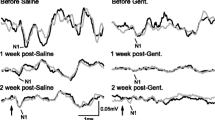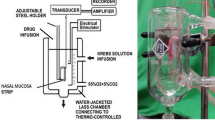Abstract
Prostaglandins (PGs) such as PGE2 and PGI2 are vasodilators, and leukotrienes (LTs) such as LTB4 and LTC4 are vasoconstrictors. Our previous studies have shown that salicylate ototoxicity is associated with decreased levels of PGs and increased levels of LTs. We hypothesized that vasodilating PGs increase cochlear blood flow and vasoconstricting LTs decrease cochlear blood flow. PGE2, Iloprost (a PGI2 analog), LTB4, and LTC4 were applied to the round window membranes of chinchillas and cochlear blood flow was measured with a laser Doppler flowmeter. PGE2 increased cochlear blood flow, while LTC4 decreased cochlear blood flow. This findings show that vasodilating PGs may have therapeutic implications for sensorineural hearing loss and/or vertigo by increasing cochlear blood flow. Vasoconstricting LTs may cause hearing loss by decreasing cochlear blood flow.
Similar content being viewed by others
Author information
Authors and Affiliations
Additional information
Received: 6 October 1998 / Accepted: 4 March 1999
Rights and permissions
About this article
Cite this article
Rhee, CK., Park, YS., Jung, T. et al. Effects of leukotrienes and prostaglandins on cochlear blood flow in the chinchilla. European Archives of Oto-Rhino-Laryngology 256, 479–483 (1999). https://doi.org/10.1007/s004050050195
Issue Date:
DOI: https://doi.org/10.1007/s004050050195




